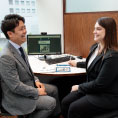会話を学ぶ「英会話講座」
2013.3.1
将来に備えて何かをする

<ふたりは、卒業後の進路の話をしています。>
EnglishJapanese
Rachel: I can’t believe we’ve just graduated! No more exams, no more essays…
Ted: I don’t know why you’re so excited. Finding a job in this economy is going to be tough.
Rachel: Oh, I‘ve already got a job lined up with an accounting firm.
Ted: No way! How did you pull that one off?
Rachel: I made some contacts there during my internship last summer and made a point of staying in touch with them.
Ted: I guess I should have done the same but I didn’t want to miss my last chance to go travelling before getting a job.
Rachel: I’m sure you’ll be able to find something. It’s not like you just spent all summer at the beach, you were busy volunteering.
Ted: True. I suppose that will look good on my résumé…
Rachel: Definitely! Anyway, now’s not the time to worry about it.
Ted: You’re right, we should be celebrating.
Rachel: Absolutely! With this economy, I have a feeling it will be a long time before we can enjoy champagne again.
Ted: Looks like my cynicism has finally rubbed off on you!
Ted: I don’t know why you’re so excited. Finding a job in this economy is going to be tough.
Rachel: Oh, I‘ve already got a job lined up with an accounting firm.
Ted: No way! How did you pull that one off?
Rachel: I made some contacts there during my internship last summer and made a point of staying in touch with them.
Ted: I guess I should have done the same but I didn’t want to miss my last chance to go travelling before getting a job.
Rachel: I’m sure you’ll be able to find something. It’s not like you just spent all summer at the beach, you were busy volunteering.
Ted: True. I suppose that will look good on my résumé…
Rachel: Definitely! Anyway, now’s not the time to worry about it.
Ted: You’re right, we should be celebrating.
Rachel: Absolutely! With this economy, I have a feeling it will be a long time before we can enjoy champagne again.
Ted: Looks like my cynicism has finally rubbed off on you!
Rachel: 卒業したなんて信じられない!もう試験もないし、論文もないのね・・・。
Ted: なんでそんな喜んでるんだよ。この不景気の中、仕事見つけるの大変なんだぞ。
Rachel: あらっ、仕事ね。もう見つけてあるの、会計事務所の仕事。
Ted: うそだろ? どうやって見つけられたんだよ。
Rachel: 去年の夏インターンシップで働いた時、ちょっとコネを作って、それから連絡を絶やさないようにしてたのよ。
Ted: 僕もそうしときゃよかったな。でも旅行に行く就職前最後のチャンスを逃したくなかったんだよね。
Rachel: きっと見つかるわよ、あなたも。夏の間ずっとビーチで過ごしたわけじゃなさそうだし。ボランティアで忙しかったんでしょ?
Ted: うん。それで履歴書の見栄えがよくなると思うけど・・・。
Rachel: 絶対なるって。まあ、とりあえず仕事の心配は後回しにして。
Ted: そうだな。今は卒業を喜ぶべきだね。
Rachel: その通り。こんな景気だから、シャンパンなんて当分飲めなそうな気がするし。
Ted: 僕の皮肉な考え方がとうとう君にもうつったみたいだな。
Ted: なんでそんな喜んでるんだよ。この不景気の中、仕事見つけるの大変なんだぞ。
Rachel: あらっ、仕事ね。もう見つけてあるの、会計事務所の仕事。
Ted: うそだろ? どうやって見つけられたんだよ。
Rachel: 去年の夏インターンシップで働いた時、ちょっとコネを作って、それから連絡を絶やさないようにしてたのよ。
Ted: 僕もそうしときゃよかったな。でも旅行に行く就職前最後のチャンスを逃したくなかったんだよね。
Rachel: きっと見つかるわよ、あなたも。夏の間ずっとビーチで過ごしたわけじゃなさそうだし。ボランティアで忙しかったんでしょ?
Ted: うん。それで履歴書の見栄えがよくなると思うけど・・・。
Rachel: 絶対なるって。まあ、とりあえず仕事の心配は後回しにして。
Ted: そうだな。今は卒業を喜ぶべきだね。
Rachel: その通り。こんな景気だから、シャンパンなんて当分飲めなそうな気がするし。
Ted: 僕の皮肉な考え方がとうとう君にもうつったみたいだな。
キーフレーズ
“have/ have got ~ lined up” (将来に備えて)~を準備する
この表現は将来に向けて物事が手配されていることを言う際によく使われます。
例)ふたりは高級レストランで結婚記念日を過ごしています。
Marcy: This restaurant is amazing! I can’t believe you managed to get a table here.
Bart: It’s only the beginning. I’ve got plenty of activities lined up for us this evening, just wait and see.
Marcy: すごいわ、このレストラン! こんなお店を予約してくれたなんて信じられないわ。
Bart: こんなもんじゃないよ。今夜のために、いろいろ楽しいことを用意しておいたから。まあ、見ててよ。
Marcy: This restaurant is amazing! I can’t believe you managed to get a table here.
Bart: It’s only the beginning. I’ve got plenty of activities lined up for us this evening, just wait and see.
Marcy: すごいわ、このレストラン! こんなお店を予約してくれたなんて信じられないわ。
Bart: こんなもんじゃないよ。今夜のために、いろいろ楽しいことを用意しておいたから。まあ、見ててよ。
“pull off~/ ~off” ~(困難なことを)成し遂げる
この表現は非常に難しいことや信じられないようなことをうまくやり遂げることを伝えるために使われます。
例)ふたりは、論文の締め切りについて話しています。
Barbara: I managed to get an extension on my deadline!
Penny: No way! How did you pull that one off? Professor Smith is usually really strict.
Barbara: どうにか延ばしてもらったわ、締め切り。
Penny: ありえない。どうやったの? Smith教授って、いつもすごく厳しいのに。
Barbara: I managed to get an extension on my deadline!
Penny: No way! How did you pull that one off? Professor Smith is usually really strict.
Barbara: どうにか延ばしてもらったわ、締め切り。
Penny: ありえない。どうやったの? Smith教授って、いつもすごく厳しいのに。
“make a point of ~” 必ず~する
このフレーズは、一見重要ではないような事柄に特に気を配ったり、努力したりすることを表わします。
例)ふたりは、風邪の容態と予防接種について話しています。
Barry: I’ve never seen you sick like this before. You’re usually so healthy.
Andy: I make a point of getting a flu shot every year but I left it too late this time.
Barry: 君がこんなに調子悪いの見たことないよ。普段はあんなに健康なのに。
Andy: 毎年必ず予防接種を受けることにしてるんだけど、今回はちょっと遅すぎたな。
Barry: I’ve never seen you sick like this before. You’re usually so healthy.
Andy: I make a point of getting a flu shot every year but I left it too late this time.
Barry: 君がこんなに調子悪いの見たことないよ。普段はあんなに健康なのに。
Andy: 毎年必ず予防接種を受けることにしてるんだけど、今回はちょっと遅すぎたな。
“rub off on ~” ~に影響を及ぼする
近くにいることにより、その人と同じような言動になることを言い表わすために使われる表現です。
例)ふたりは、子どもの行儀について話しています。
Emma: Don’t worry so much, sometimes boys misbehave. I’m sure he’ll learn.
Tamara: Either way, I’m hoping your son’s good manners start rubbing off on him.
Emma: そんなに心配しなくていいんじゃない。お行儀悪いこともあるわよ。男の子だもん。そのうちきっと分別がつくようになるわ。
Tamara: いずれにしても、あなたの子のお行儀のよさにうちの子が影響受けてくれたらいいんだけど。
Emma: Don’t worry so much, sometimes boys misbehave. I’m sure he’ll learn.
Tamara: Either way, I’m hoping your son’s good manners start rubbing off on him.
Emma: そんなに心配しなくていいんじゃない。お行儀悪いこともあるわよ。男の子だもん。そのうちきっと分別がつくようになるわ。
Tamara: いずれにしても、あなたの子のお行儀のよさにうちの子が影響受けてくれたらいいんだけど。


 【Gabaからのお知らせ】
【Gabaからのお知らせ】 【特集】
【特集】 【英単語の正しい使い分け】
【英単語の正しい使い分け】 【使いこなす句動詞】
【使いこなす句動詞】